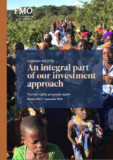FMO has published its first Human Rights Progress Report. Each year, FMO invests around €1.6 billion and catalyzes around €0.9 billion investments from third parties in developing countries to empower entrepreneurs to build a better world. Respect for human rights is a fundamental and non-negotiable part of FMOs mission and is integral to the way we select and support our clients and partners.
Peter van Mierlo, Chief Executive Officer at FMO, said: “Respecting human rights is core to FMO’s mission and a precondition for sustainable development. As an integral part of our environmental and social approach, we systematically address human rights throughout our investment process. We have embedded 35 Environmental & Social Officers within our investment teams to identify and manage human rights in conjunction with our clients throughout our projects. This approach helps us to address human rights in a more formal and systematic way, improving our due diligence practices and management systems.”
Progress made
NGOs and other external stakeholders played a key role in helping us to formulate our Human Rights Position Statement, which we published in September 2017. The Human Rights Progress Report describes the progress made towards further embedding of human rights in our way of working in accordance with the United Nations Guiding Principles on Business and Human Rights (UN Guiding Principles) Reporting Framework.
From October 2017 onwards, we started to operationalize the commitments made in our Position Statement, focusing on three main areas of activity to strengthen our human rights due diligence.
Firstly, supported by external human rights experts, we have developed and implemented our human rights due diligence guidance to support our Environmental & Social staff as they explicitly apply a human rights lens to our existing due diligence processes. Secondly, we have developed and implemented a series of internal training and awareness-raising sessions. Thirdly, we ran a pilot of five Human Rights Risk Assessments to understand if, how, when and where these assessments add additional information to existing ESIA (Environmental and Social Impact Assessment) approach. The insights from this pilot will inform future Human Rights Risk Assessments as well as additional expertise a dedicated human rights specialist can bring.






